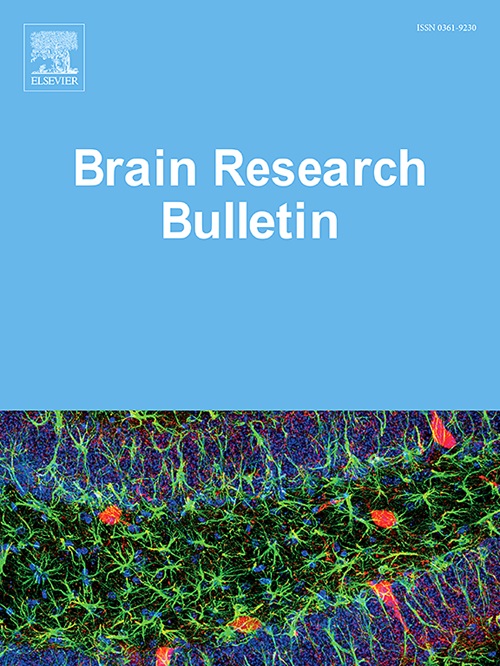慢性压力会诱发胰岛素抵抗,并加重注意力缺失症的认知障碍。
IF 3.5
3区 医学
Q2 NEUROSCIENCES
引用次数: 0
摘要
背景:慢性压力可诱发认知障碍,甚至促进阿尔茨海默病(AD)的发生和发展。有证据表明,慢性应激会影响糖代谢,而这两者都与阿尔茨海默病有关。在此,我们重点研究了胰岛素抵抗对糖代谢的影响,并进一步评估了其在认知和病理方面的变化:雄性9月龄野生型小鼠和APP/PS1小鼠随机分为4组。方法:将9个月大的雄性野生型和APP/PS1小鼠随机分为4组,慢性不可预测轻度应激(CUMS)组小鼠暴露4周。利用稳态模型评估(HOMA)评价胰岛素敏感性。共检测了 84 个与胰岛素信号通路相关的基因,以进行快速筛选。此外,还检测了海马中胰岛素受体(IR)、IR底物1(IRS1)、c-Jun N-末端激酶(JNK)和淀粉样蛋白的磷酸化蛋白表达。认知功能通过伦理学方法进行评估。认知功能通过莫里斯水迷宫(MWM)和被动回避测试(PAT)进行评估:结果:暴露于 CUMS 四周后,HOMA 值明显升高,表明胰岛素敏感性降低。Insr和Lipe的基因表达下调。此外,分析表明基因型(野生型与 APP/PS1)和 CUMS 处理对胰岛素受体底物 1(IRS1)磷酸化蛋白表达有明显的交互作用。具体来说,在野生型小鼠和APP/PS1小鼠的海马中,CUMS暴露增加了胰岛素受体后信号通路中的抑制性磷酸化位点(IRS1-pSer636),减少了兴奋性磷酸化位点(IRS1-pTyr465)。此外,通过莫里斯水迷宫(MWM)和被动回避测试(PAT)评估,CUMS暴露诱导并加剧了野生型和APP/PS1小鼠的认知障碍。然而,CUMS对野生型小鼠的老年斑沉积或Aβ42和Aβ40水平没有明显影响:结论:慢性应激会通过胰岛素抵抗严重影响海马认知功能,并加剧老年痴呆症的病理变化。这项研究揭示了慢性应激、胰岛素抵抗和AD之间的复杂关系,为开发针对慢性应激和胰岛素抵抗的干预措施提供了新的见解。本文章由计算机程序翻译,如有差异,请以英文原文为准。
Chronic stress induces insulin resistance and enhances cognitive impairment in AD
Background
Chronic stress can induce the cognitive impairment, and even promote the occurrence and development of Alzheimer's disease (AD). Evidence has suggested that chronic stress impacts on glucose metabolism, and both of these have been implicated in AD. Here we focused on the effect of insulin resistance in glucose metabolism, and further evaluated the changes in cognition and pathology.
Methods
Male 9-month-old wild-type and APP/PS1 mice were randomly divided into 4 groups. Mice in the chronic unpredictable mild stress (CUMS) groups were exposed for 4 weeks. Homeostatic Model Assessment (HOMA) was utilized to evaluate insulin sensitivity. A total of eighty-four genes related to the insulin signaling pathway were examined for rapid screening. Additionally, the phosphorylated protein expressions of insulin receptors (IR), IR substrate 1 (IRS1), c-Jun N-terminal kinase (JNK), and amyloid were detected in the hippocampus. Cognitive function was assessed through ethological methods. Cognitive function was assessed using both the Morris water maze (MWM) and the Passive avoidance test (PAT).
Results
Four weeks of CUMS exposure significantly increased the HOMA value, indicating reduced insulin sensitivity. The gene expressions of Insr and Lipe were downregulated. Additionally, the analysis revealed a significant interaction between the genotype (wild-type vs. APP/PS1) and CUMS treatment on the phosphorylated protein expressions of insulin receptor substrate 1 (IRS1). Specifically, CUMS exposure increased the inhibitory phosphorylation site (IRS1-pSer636) and decreased the excitatory phosphorylation site (IRS1-pTyr465) in the post-insulin receptor signaling pathway within the hippocampus of both wild-type and APP/PS1 mice. Moreover, CUMS exposure induced and exacerbated cognitive impairments in both wild-type and APP/PS1 mice, as assessed by the Morris water maze (MWM) and Passive avoidance test (PAT). However, there was no significant effect of CUMS on senile plaque deposition or levels of Aβ42 and Aβ40 in wild-type mice.
Conclusions
Chronic stress significantly affects hippocampal cognitive function through insulin resistance and exacerbates AD pathology. This study reveals the complex relationship between chronic stress, insulin resistance, and AD, providing new insights for developing interventions targeting chronic stress and insulin resistance.
求助全文
通过发布文献求助,成功后即可免费获取论文全文。
去求助
来源期刊

Brain Research Bulletin
医学-神经科学
CiteScore
6.90
自引率
2.60%
发文量
253
审稿时长
67 days
期刊介绍:
The Brain Research Bulletin (BRB) aims to publish novel work that advances our knowledge of molecular and cellular mechanisms that underlie neural network properties associated with behavior, cognition and other brain functions during neurodevelopment and in the adult. Although clinical research is out of the Journal''s scope, the BRB also aims to publish translation research that provides insight into biological mechanisms and processes associated with neurodegeneration mechanisms, neurological diseases and neuropsychiatric disorders. The Journal is especially interested in research using novel methodologies, such as optogenetics, multielectrode array recordings and life imaging in wild-type and genetically-modified animal models, with the goal to advance our understanding of how neurons, glia and networks function in vivo.
 求助内容:
求助内容: 应助结果提醒方式:
应助结果提醒方式:


